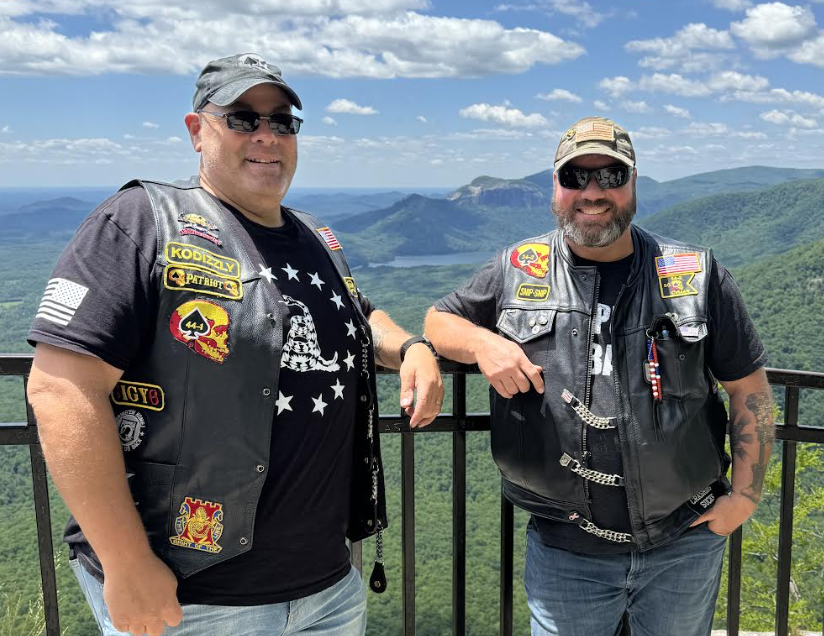
- Details
- By Native News Online Staff
In 2026, Army veterans Randy Merrill and Brian Cassidy will set off on a nearly 10,000-mile journey across Native Country as participants in the Hoka Hey Motorcycle Challenge. Their mission: raise $10,000 for the Association on American Indian Affairs (AAIA) and find healing through the road.
“We are two Army veterans, brothers in arms, bonded by combat, scars, and the quiet battles that never seem to end,” write Randy and Brian in their joint statement. “PTSD and pain followed us home. But we refuse to be defined by the damage.”
The Hoka Hey Motorcycle Challenge is far from an ordinary ride. Spanning thousands of miles across Turtle Island’s back roads, it demands unwavering physical and mental strength, spiritual reflection, and humility. Riders navigate the route without GPS, sleep under open skies, and face unpredictable terrain and weather conditions—all while remaining grounded in their purpose.
To make the journey possible, Randy and Brian are seeking sponsors to help cover their essential travel costs. In addition to the $10,000 they aim to raise for AAIA, they are also fundraising another $10,000 for expenses like fuel, safety equipment, maintenance, tires, and daily essentials.
“We’re committed to finishing this ride with integrity and purpose,” they said. “But we can’t do it alone. Every sponsor helps carry us forward—mile by mile.”
For them, the road represents more than just a challenge. “The Hoka Hey Motorcycle Challenge isn’t just a ride: It’s a test of endurance, spirit, and soul. The rhythm of the engine drowns out the chaos in our heads. Every sunrise we chase is a reminder we’re still alive.”
Funds raised will benefit the Association on American Indian Affairs, the oldest nonprofit serving Native Country. Their contributions will support AAIA’s core initiatives:
-
Next Generations, which uplifts Native youth and families through scholarships, cultural programs, and healing efforts;
-
Cultural Sovereignty, advancing the return of stolen lands, Ancestors, and Indigenous languages;
-
Becoming an Ally, a public education campaign building broader awareness of Native Nations and driving equity.
“This ride is about raising awareness of the strength and resilience of Native Nations and doing our part to support justice and healing,” said Brian, a Purple Heart recipient with combat tours in Iraq and Afghanistan.
“This Challenge represents something deeper than miles traveled—it’s about healing, service, and standing in solidarity with Native Peoples,” added Shannon O’Loughlin, a citizen of the Choctaw Nation of Oklahoma and CEO and Attorney for the Association. “Randy and Brian are not just riding to raise funds—they’re strong non-Native allies carrying a message: that Native Nations are sovereign, and diverse Native homelands and cultures are worthy of protection.”
Supporters can follow the riders and donate at: indian-affairs.org/hokaheymotorcyclechallenge.
Individuals or organizations contributing $500 or more will be recognized as official ride sponsors, with their name or linked logo displayed on the Association’s challenge webpage. To be featured, donors should email their logo and website link to [email protected] after making a qualifying contribution. This offers a meaningful way for sponsors to stand in visible solidarity with Native Peoples and support the mission of the ride and the AAIA.
“Every dollar gets us one mile closer,” said Randy, who served 15 years in the Army. “We’re riding for purpose, pride, and to stand with Native Peoples across Turtle Island.”
More Stories Like This
Native News Weekly (August 25, 2024): D.C. BriefsScope Narrowed, Report Withheld: Questions Mount Over Michigan Boarding School Study
Zuni Youth Enrichment Project Announces Family Engagement Night and Spring Break Youth Programming
Next on Native Bidaské: Leonard Peltier Reflects on His First Year After Prison
Deb Haaland Rolls Out Affordability Agenda in Albuquerque
Help us defend tribal sovereignty.
At Native News Online, our mission is rooted in telling the stories that strengthen sovereignty and uplift Indigenous voices — not just at year’s end, but every single day.
Because of your generosity last year, we were able to keep our reporters on the ground in tribal communities, at national gatherings and in the halls of Congress — covering the issues that matter most to Indian Country: sovereignty, culture, education, health and economic opportunity.
That support sustained us through a tough year in 2025. Now, as we look to the year ahead, we need your help right now to ensure warrior journalism remains strong — reporting that defends tribal sovereignty, amplifies Native truth, and holds power accountable.
 The stakes couldn't be higher. Your support keeps Native voices heard, Native stories told and Native sovereignty defended.
The stakes couldn't be higher. Your support keeps Native voices heard, Native stories told and Native sovereignty defended.
Stand with Warrior Journalism today.
Levi Rickert (Potawatomi), Editor & Publisher


